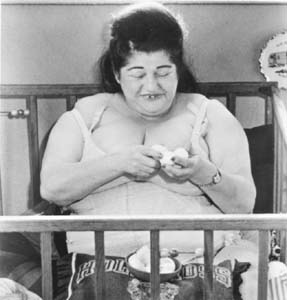![[Metroactive Movies]](/movies/gifs/movies468.gif)
![[Metroactive Movies]](/movies/gifs/movies468.gif)
[ Movies Index | Metro | Metroactive Central | Archives ]
The Value of Shock
Photo by Greg Gorman
The trash aesthetic of 'Pink Flamingos' cult director John Waters has inspired a generation of revolutionary bad taste
'I LIKE TO THINK I make American comedies," director John Waters wrote in his book Shock Value. Waters' monstrous comedy Pink Flamingos (1972), newly rereleased, still reigns as the most offensive movie ever made. It is one long worst-case scenario.
From bad hair styling to shit eating, Waters leaves no taboo unbroached; and despite recent grandstanding by Celine Dion, Pink Flamingos' star, Divine, still holds her title as "the filthiest person in the world." Although the movies in general have started to gain on Waters, Pink Flamingos is so far beyond the pale that Hollywood may never catch up.
I saw the revived Pink Flamingos a few weeks ago, back to back with an erstwhile cutting-edge Gen X film about oppressed teenage lesbians mixed up with drugs. In the broad sense, the two films shared subject matter; the newer movie even included a few vomiting scenes (like the ones that helped give Pink Flamingos its cachet) in a hopeless attempt to make the picture grittier and less vague.
Pink Flamingos commands an audience's respect; the Gen X movie just whimpered for it. If I'd had a choice between Depressed Street Kids and Pink Flamingos at the Sundance Film Festival--where they both appeared--it would have been a very easy pick, especially since Pink Flamingos was sporting new sound, an at-last unpirated soundtrack and a series of outtakes hosted by the nattily dressed Waters.
Watery Web:
The Pink Flamingos home page.
An interview with Waters about his book Crackpot.
An extensive fan page for Waters.
Weirdos on the Prowl
THE MOST extreme of all American filmmakers came from a functional and very Catholic family of rock-ribbed Republicans. Waters, a University of Baltimore and New York University dropout, shot Pink Flamingos for $10,000 on the rural property of one Bob Adams, a.k.a. "The Psychedelic Pig." The film's lone set, besides Waters' apartment, was a half-burned trailer, bought for $100 and towed far into the frozen mud of the Maryland outback.
Waters had the trailer surrounded with a flock of pink plastic lawn flamingos and what he calls a "gazing ball"--those mysterious chromed bowling balls you see sitting on pedestals in the more tasteful front yards on the East Coast. Waters ran a mile-long extension cord into Adams' house for power and shot his film with an Auricon 16mm camera that kept freezing up because of the cold.
Pink Flamingos and Desperate Living, Waters' other outdoor film, were both made in the dead of winter; the stunted, leafless forests through which Waters' weirdoes prowl add to the general air of neglect and abandonment.
Pink Flamingos stars Waters' friend Glenn Milstead, a.k.a. Divine (Waters probably picked the name from Jean Genet's novel of prison love, Our Lady of the Flowers). Divine, a gloriously outsized cross dresser, lives a peaceful life in her trailer with skanky traveling companion Cotton (Mary Vivian Pearce), hillbilly psycho son Crackers (Danny Mills) and 300-pound, anality-stricken, egg-sucking Mama Edie (Edith Massey).
Their trailer is a paradise of filth--a blend of common bad taste and Tennessee Williamsstyle psychosexual troubles. Divine and her family are menaced by the scheming jealousy of their rivals: Raymond Marble, an electric-blue-dyed version of Salvador Dali (David Lochary), and his cruel wife, Connie (Nancy "Mink" Stole). The Marbles are baby-farmers and foot fetishists who mock the laws of God and man. (During one love scene, Raymond moans, "I love you more than Original Sin itself.")
Pink Flamingos co-stars dozens of Baltimore's most outré citizens, including--in one unbelievable scene--a real asshole who does a karaoke version of the Trashmen's "Surfin' Bird."
Pink Flamingos became the first and greatest of all midnight movies--the kind of film that drugs, the lateness of the hour and the peculiarity of its fans all conspire to make you doubt the evidence of your eyes even as you watch it. Waters followed Pink Flamingos with other, similarly vile projects, up to the ambitiously offensive Desperate Living (1977), which essentially took the house trailer from Pink Flamingos and turned it into an entire community, called Mortville.
FROM THAT POINT, Waters moved up to 35mm, bigger budgets and comparatively gentle moviemaking. See the lightly comic but heartfelt interracial necking scene in Hairspray (1988), scored to Touissant McCall's beautiful ballad "Nothing Can Take the Place of You"; the moment is so sweet that it seems the work of another sensibility altogether.
(Divine also went uptown. In Pink Flamingos she pounces on a dog turd in a finale that, as Waters predicted, no one would ever forget. I can't say I've ever seen this famous snippet of film--or the "chicken scene," which is even worse. My hand is always over my eyes every time they pop up on screen. Still, Divine's publicity stunt had legs. Clips from Hairspray were featured on the 1996 Academy Awards broadcast.)
But if Waters is, well, not quite mainstream, but socially acceptable enough to have made it to the Museum of Modern Art, his scheme of things hasn't changed from Pink Flamingos to Serial Mom (1994).
The common theme in all of Waters' work is man (and woman and transvestite) against society. He always tells tales of criminal careers and incipient revolutions. In Desperate Living, rebels overthrow the debauched Queen Carlotta (Edith Massey); similarly, the oppressive squares in Polyester, Hairspray and Cry-Baby are overthrown in the end.
American comedies don't get as much respect as detective movies or Westerns, so it's rarely noticed that Waters is most serious when he's least earnest. Since Waters is dismissed as a cult director, the radical quality of his work is also often dismissed. Cult is at best a meaningless term; as Waters comments in Shock Value, "All 'cult' really means today is that something is popular and no one foresaw its success."
Trashy World View
WATERS IS now best known as an urbane wit with a pencil-thin mustache. The mild-mannered personality defuses criticism. Waters was a different creature when he directed Pink Flamingos. The movie is rough and crude it's flatering to call the camera work "basic," and yet, for all its amateurishness, Pink Flamingos is a very driven film.
Waters once wrote of his partners in bad taste, "We were a dedicated group, overanxious and driven to share our trashy vision of the world." The thrust and extremity of Waters' films--with their overblown threats and malicious dialogue, their maniacal inventiveness and of course their shock humor--compel you to watch.
Waters made an ingenious discovery of an antisocial current that runs from French thinkers such as de Sade, Genet and Celine straight to gorehound horrors like Herschell Gordon Lewis' Two Thousand Maniacs! and the other grindhouse "roughies" that the director consumed by the dozens. Linking the iciness of continental nihilism with the larger-than-life sex and violence of American exploitation films, Waters created his own revolutionary hybrid of rancor and camp.
Waters' aim was, as he wrote in his book Crackpot, to make "low-brow films for high-brow theaters." He denies any political content in his work, even admitting to voting for Gerald Ford in 1976, presumably for the shock value of it all. But the films of John Waters have become political just because of their contrast with the times.
They don't plead for tolerance; they demand it at gunpoint. Pink Flamingos is an early culture-war atrocity. (Those reactionaries, like George Will, who have been trying to kick a little extra dirt on Allen Ginsberg's grave--if only they could get a load of this movie!) It's not for nothing that Shock Value was translated into French as Provocations.
Edith Massey's Aunt Ida, in Female Trouble (1974), delivers a speech to her nephew that's fit for one of Congressman Dannemeyer's nightmares: "I'd be so proud if you was a fag and had a nice beautician boyfriend. I'd never have to worry. I worry you'll work in an office, have children, celebrate wedding anniversaries. The world of a heterosexual is a sick and boring life!"
Martyr the Oppressor
LET'S GIVE Waters the benefit of the doubt--he may not be consciously political, but he has a quality that political filmmakers ought to imitate. He doesn't talk down to people in struggle; he doesn't try to flatter them with their innate decency and nobility.
Waters' films don't make martyrs out of the victimized; instead, the films counsel them to go and make some martyrs out of their oppressors.
Desperate Living is a comedy about revolution that ends with the cooking and eating of the evil Queen Carlotta. We all know that revolution devours its children, but Desperate Living reminds us that at least the children get a good meal out of it first.
The rereleased Pink Flamingos--amid the current sad herd of youth movies about persecuted little inarticulate creatures--is a jolt, and so Waters does stand a chance, as he wrote in 1981, of becoming "a negative role model for a whole new generation of bored youth."
His aesthetic of bad taste has spread like wildfire since 1972. Years after Pink Flamingos began playing the midnight-movie circuit, punk rock adopted the film's shocking pinks, fake fur and unnatural hair colors as a fashion statement. Gross-out comedies such as the movie Kingpin and the TV shows Men Behaving Badly and Married ... With Children exist because of the barriers that Waters broke.
The newsprint crime tabloids he once raided for ideas are now multi-million-dollar television shows. Waters, the recreational trial watcher, could, if he were so inclined, view a cable channel that broadcasts nothing but trials.
The director has triumphed. By demonstrating the comic power of shattering social laws, John Waters has had a powerful influence on popular culture. This is achievement enough.
More remarkably, however, the impact of his own work hasn't been diluted by either time or the filmmakers who have followed his lead in the quarter century since Pink Flamingos first made an audience gag.
[ Metro | Metroactive Central | Archives ]
This page was designed and created by the Boulevards team.

Avert Your Eyes: Director John Waters has made a career out of turning gross-outs into box-office grosses.![[line]](/gifs/line.gif)
![[line]](/gifs/line.gif)

Dog Doo Afternoon: Fat, egg-sucking Mama Edie (Edith Massey) is only a second-place finisher in the 'Pink Flamingo' Grossout Derby.
Pink Flamingos (NC-17; 92 min.), directed and written by John Waters, photographed by David Insley and starring Divine, Mink Stole and Edith Massey.
From the April 24-30, 1997 issue of Metro